英国文学简史结课论文ThePilgrim'sProgress
- 格式:doc
- 大小:39.00 KB
- 文档页数:4
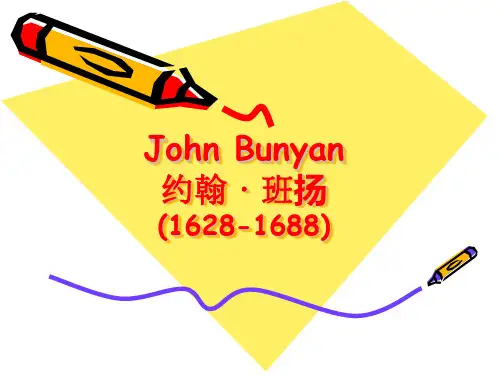
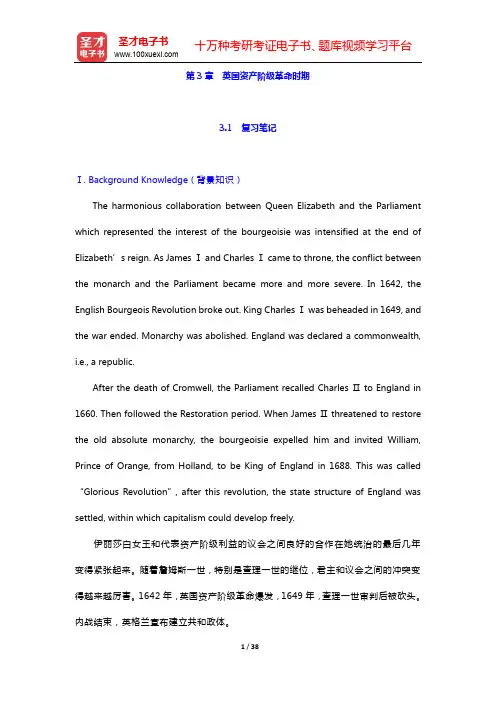
第3章英国资产阶级革命时期3.1 复习笔记Ⅰ. Background Knowledge(背景知识)The harmonious collaboration between Queen Elizabeth and the Parliament which represented the interest of the bourgeoisie was intensified at the end of Elizabeth’s reign. As JamesⅠ and Charles Ⅰ came to throne, the conflict between the monarch and the Parliament became more and more severe. In 1642, the English Bourgeois Revolution broke out. King Charles Ⅰ was beheaded in 1649, and the war ended. Monarchy was abolished. England was declared a commonwealth, i.e., a republic.After the death of Cromwell, the Parliament recalled Charles Ⅱ to England in 1660. Then followed the Restoration period. When James Ⅱ threatened to restore the old absolute monarchy, the bourgeoisie expelled him and invited William, Prince of Orange, from Holland, to be King of England in 1688. This was called “Glorious Revolution”, after this revolution, the state structure of England was settled, within which capitalism could develop freely.伊丽莎白女王和代表资产阶级利益的议会之间良好的合作在她统治的最后几年变得紧张起来。
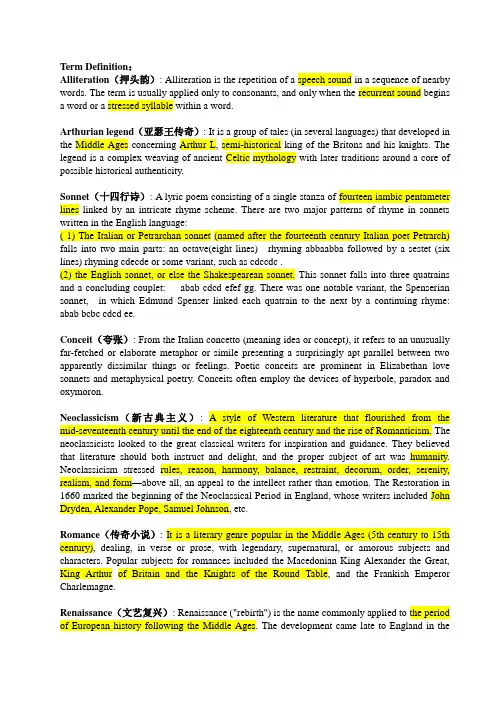
Term Definition:Alliteration(押头韵): Alliteration is the repetition of a speech sound in a sequence of nearby words. The term is usually applied only to consonants, and only when the recurrent sound begins a word or a stressed syllable within a word.Arthurian legend(亚瑟王传奇): It is a group of tales (in several languages) that developed in the Middle Ages concerning Arthur L, semi-historical king of the Britons and his knights. The legend is a complex weaving of ancient Celtic mythology with later traditions around a core of possible historical authenticity.Sonnet(十四行诗): A lyric poem consisting of a single stanza of fourteen iambic pentameter lines linked by an intricate rhyme scheme. There are two major patterns of rhyme in sonnets written in the English language:( 1) The Italian or Petrarchan sonnet (named after the fourteenth century Italian poet Petrarch) falls into two main parts: an octave(eight lines) rhyming abbaabba followed by a sestet (six lines) rhyming cdecde or some variant, such as cdccdc .(2) the English sonnet, or else the Shakespearean sonnet. This sonnet falls into three quatrains and a concluding couplet: abab cdcd efef gg. There was one notable variant, the Spenserian sonnet, in which Edmund Spenser linked each quatrain to the next by a continuing rhyme: abab bcbc cdcd ee.Conceit(夸张): From the Italian concetto (meaning idea or concept), it refers to an unusually far-fetched or elaborate metaphor or simile presenting a surprisingly apt parallel between two apparently dissimilar things or feelings. Poetic conceits are prominent in Elizabethan love sonnets and metaphysical poetry. Conceits often employ the devices of hyperbole, paradox and oxymoron.Neoclassicism(新古典主义): A style of Western literature that flourished from the mid-seventeenth century until the end of the eighteenth century and the rise of Romanticism. The neoclassicists looked to the great classical writers for inspiration and guidance. They believed that literature should both instruct and delight, and the proper subject of art was humanity. Neoclassicism stressed rules, reason, harmony, balance, restraint, decorum, order, serenity, realism, and form—above all, an appeal to the intellect rather than emotion. The Restoration in 1660 marked the beginning of the Neoclassical Period in England, whose writers included John Dryden, Alexander Pope, Samuel Johnson, etc.Romance(传奇小说): It is a literary genre popular in the Middle Ages (5th century to 15th century), dealing, in verse or prose, with legendary, supernatural, or amorous subjects and characters. Popular subjects for romances included the Macedonian King Alexander the Great, King Arthur of Britain and the Knights of the Round Table, and the Frankish Emperor Charlemagne.Renaissance(文艺复兴): Renaissance ("rebirth") is the name commonly applied to the period of European history following the Middle Ages. The development came late to England in thesixteenth century, and did not have its flowering until the Elizabethan and Jacobean periods. It also has been described as the birth of the modem world out of the ashes of the Dark Ages. Soliloquy(独白): Soliloquy is the act of talking to oneself, whether silently or aloud. In drama it denotes the convention by which a character, alone on the stage, utters his or her thoughts aloud.Metaphysical poetry(玄学派诗歌): A term that can be applied to any poetry that deals with philosophical or spiritual matters but that is generally limited to works written by a specific group of 17th century poets who wrote in the manner of the poet John Donne. The metaphysical poets are linked by style and modes of poetic organization. Common elements include the following: (1) an analytical approach to subject matter; (2) colloquial language; (3) rhythmic patterns that are often rough or irregular, and (4) the metaphysical conceit, a figurative device used to capture thought and emotion as accurately as possible.Graveyard school of poetry(墓园派诗歌): It refers to a group of 18 century English poets who emphasized subjectivity, mystery, and melancholy. Death, mortality (immortality), and gloom were frequent subjects or elements of their meditative poems, which were often actually set in graveyards. Thomas Gray's "Elegy Written in a Country Churchyard" is the most famous example.In the year 1066, the Normans defeated the Anglo-Saxons at the battle of HastingsIn the 14th century, the two most important writers are Chaucer and Langland.Today Chaucer is acclaimed not only as “the father of English Poetry” but also as “the father of English fiction”. His masterpiece is The Canterbury TalesThe fifteenth century has been described as the barren age in English literature. But it is the spring tide of English balladsIn the 15th century, there is only one important prose writer whose name is Thomas Malory He wrote an important work called Morte D’Arthur.“the Canterbury Tales” contain in fact a general Prologue and only 24 tales, of which two are left unfinished.The Prologue provides a framewor k for the tales in “the Canterbury Tales” , and it comprises a group of vivid pictures of various medieval figures.“the Canterbury Tales” is Chaucer’s greatest work and written for the greater part in heroic couplets.the name of the “jolly innkeeper” in “ the Canterbury Tales” is Harry Baily, who proposes that each pilgrim of the 32 should tell two tales on the way to Canterbury and two more on the way back.“the Canterbury Tales” opens with a general Prologue where we are told of a company of polgrims that gathered at Tabard Inn in Southwark, a suburb of London.The Pilgrims in “the Canterbury Tales” are on their way to the shrine of St. Thomas a Becket at a place named Canterbury.Chaucer’s work “The Canterbury Tales” gives us a picture of th e condition of English life of his day, such as its work and play, its deeds and dreams , its fun and sympathy.The 16th century in England was a period of the breaking up of feudal relations and the establishing of the foundations of capitalism.Thom as More wrote his famous prose work “Utopia”.In Elizabeth Period, Francis Bacon wrote more than fifty excellent essays, which made him one of the best essayists in English literature.Edmund Spencer is often referred to as “the poet’s poet”.Spencer is generally regarded as the greatest nondramatic poet of the Elizabethan Age. His fame is chiefly based on his masterpiece “The Faerie Queene”.“When in disgrace with fortune and men’s eyes” is the beginning line of a sonnet written by William Shakespeare.In the Elizabethan Age, William Shakespeare the greatest playwright of England.In Elizabethan Period, Francis Bacon wrote many excellent essays, such as “Of Studies”. Edmund Spencer wrote the masterpiece “The Faerie Queene”.“Hamlet”, “Othello”, “King Lear”, and “Macbeth”are generally regarded as Shakespeare’s four great tragedies.Christopher Marlowe was the most gifted of the university wits. He Produced in all six plays and several poems.“Shall I compare thee to a summer’s day” is one of William Shakespeare’s best known sonnets.“The Tragical History of Doctor Faustus” is one of Christopher Marlowe’s best plays.“Of Youth and Age” is one of the essays written by Francis Bacon.In 1642, civil war broke out in England, the royalists were defeated by the parliament army led by Oliver Cromwell. In 1649, Charles I was sentenced to death, and England was declared to be a commonwealth.The revolution period is also called the Puritan age, because the English revolution was carried out under a religious cloak.The Revolution Period produced one of the most important poets in English literature, whose name is John Milton.John Milton is the greatest writer of the seventeenth century, and one of the giants of English literature.In Revolution Period John Milton towers over his age as William Shakespeare towers over the Elizabethan Age and as Chaucer towers over the Medieval period.During the civil war and the commonwealth, there were two leaders in England, Cromwell , the man of action, and John Milton, the man of thought.In 1637 Milton wrote the finest pastoral elegy in English, Lycidas, to memorize the tragic death of a Cambridge friend.Milton wrote his masterpiece Paradise Lost during his blindness.In the field of prose writing of the Puritan Age,John Bunyan occupied the most important place.The Pilgrim’s Progress has been one of the most popular pieces of Christian writing produced during the Puritan Age.John Bunyan wrote his masterpiece The Pilgrim’s P rogress during his second imprisonment.The Pilgrim’s Progress gives a vivid and satirical description of Vanity Fair which is the symbol of London at the time of Restoration.Dryden wrote many works on literary criticism, and has been regarded as the earliest literary critic of real importance in the history of English literature. The famous piece is “An Essay of Dramatic Poesy”. He has been called Father of English prose.“All for Love” is Dryden’s tragedy based on the story of Antony and Cleopatra under the influence of Shakespeare’s tragedy “Antony and Cleopatra”.The literature of the middle and later periods of the 17th century cultimated in the poetry of John Milton and in the prose writing of John Bunyan , and also in the plays and literary criticism of John Dryden.。
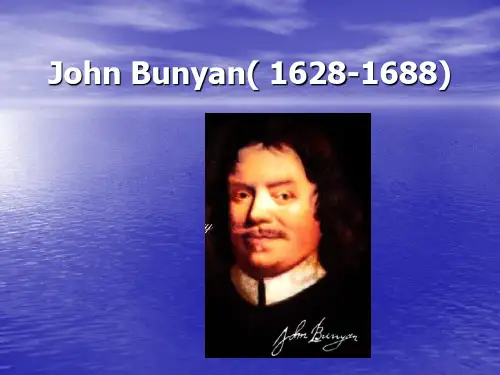
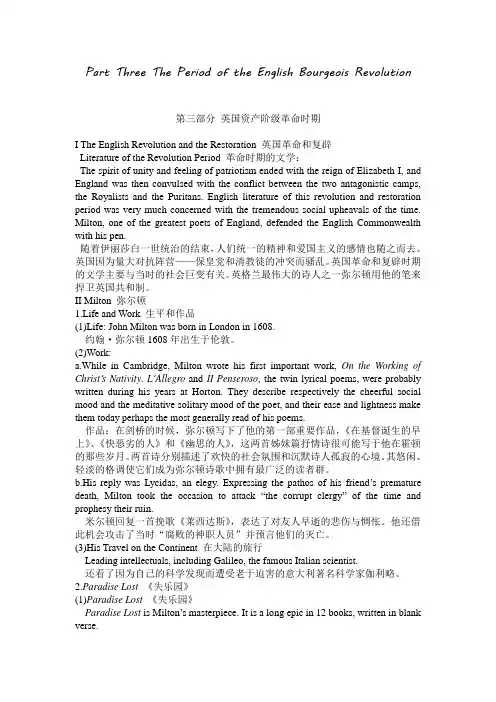
Part Three The Period of the English Bourgeois Revolution第三部分英国资产阶级革命时期I The English Revolution and the Restoration 英国革命和复辟Literature of the Revolution Period 革命时期的文学:The spirit of unity and feeling of patriotism ended with the reign of Elizabeth I, and England was then convulsed with the conflict between the two antagonistic camps, the Royalists and the Puritans. English literature of this revolution and restoration period was very much concerned with the tremendous social upheavals of the time. Milton, one of the greatest poets of England, defended the English Commonwealth with his pen.随着伊丽莎白一世统治的结束,人们统一的精神和爱国主义的感情也随之而去。
英国因为量大对抗阵营——保皇党和清教徒的冲突而骚乱。
英国革命和复辟时期的文学主要与当时的社会巨变有关。
英格兰最伟大的诗人之一弥尔顿用他的笔来捍卫英国共和制。
II Milton 弥尔顿1.Life and Work 生平和作品(1)Life: John Milton was born in London in 1608.约翰·弥尔顿1608年出生于伦敦。
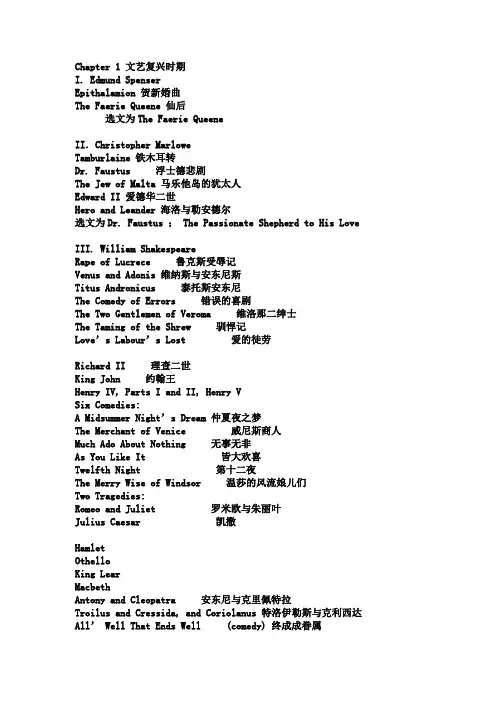
Chapter 1 文艺复兴时期I. Edmund SpenserEpithalamion 贺新婚曲The Faerie Queene 仙后选文为The Faerie QueeneII.Christopher MarloweTamburlaine 铁木耳转Dr. Faustus 浮士德悲剧The Jew of Malta 马乐他岛的犹太人Edward II 爱德华二世Hero and Leander 海洛与勒安德尔选文为Dr. Faustus ; The Passionate Shepherd to His LoveIII. William ShakespeareRape of Lucrece 鲁克斯受辱记Venus and Adonis 维纳斯与安东尼斯Titus Andronicus 泰托斯安东尼The Comedy of Errors 错误的喜剧The Two Gentlemen of Veroma 维洛那二绅士The Taming of the Shrew 驯悍记Love’s Labour’s Lost爱的徒劳Richard II 理查二世King John 约翰王Henry IV, Parts I and II, Henry VSix Comedies:A Midsummer Night’s Dream 仲夏夜之梦The Merchant of Venice 威尼斯商人Much Ado About Nothing 无事无非As You Like It 皆大欢喜Twelfth Night 第十二夜The Merry Wise of Windsor 温莎的风流娘儿们Two Tragedies:Romeo and Juliet 罗米欧与朱丽叶Julius Caesar 凯撒HamletOthelloKing LearMacbethAntony and Cleopatra 安东尼与克里佩特拉Troilus and Cressida, and Coriolanus 特洛伊勒斯与克利西达All’ Well That Ends Well (comedy) 终成成眷属Measure for Measure (comedy) 一报还一报Pericles 伯里克利Cymbeline 辛白林The Winter’s Tale冬天的故事The Tempest 暴风雨Henry VIIIThe Two Noble Kinsmen两位贵族亲戚选文为Sonnet 18; The Merchant of Venice; HamletIV. Francis BaconThe Advancement of Learning 论科学的价值与发展Novum Organum 新工具Apophthagmes New and Old 新旧格言录The History of the Reign of Henry VIIThe New Atlantis 新大西岛Maxims of Law 法律原理The Learning Reading upon the Statute of Uses法令使用读书选文Of StudiesV. John DonneThe Elegies and Satires 挽歌与十四行诗The Songs and Sonnets 歌谣与十四行诗Holy Sonnets 圣十四行诗A Hymns to God the Father 给圣父的赞美诗选文The Rising Sun; Death Be Not ProudVI. John MiltonParadise Lost 失乐园Paradise Regain 复乐园Samson Agonistes力士参孙Lycidas 利西达斯Areopagitica 论出版自由Chapter 2 新古典主义时期I. John BunyanThe Pilgrim’s Progress 天路历程Grace Abounding to the Chief of Sinners 罪人头目的赫免The Life and Death of Mr. Badman 拜德门先生生死录The Holy War 圣战选文The Vanity Fair (from the The Pilgrim’s Progress)II. Alexander PopeThe Dunciad 群愚史诗An Essay on Criticism 论批评The Rape of the Lock 夺发记选文An Essay on CriticismIII. Daniel DefoeRobinson Crusoe 鲁宾逊漂流记Captain Singleton 辛立顿船长Moll Flanders 莫尔弗兰德斯Colonel Jack 杰克上校A Journal of the Plague Year 灾疫之年的日记Roxana 罗克萨那选文Robinson CrusoeIV. Jonathan SwiftA Tale of Tub 木桶传The Battle of the Books 书籍的战斗Gulliver’s Travels 格列弗游记A Modest Proposal 一个小小的建议The Drapier’s Letters 布商的书信选文Gulliver’s TravelsV. Henry FieldingThe Coffee House Politician 咖啡屋的政治家The Tragedy of the Tragedies 悲剧中的悲剧The Historical Register for the Year 1736 1736历史年鉴The History of the Adventures of Joseph Andrews and of his friend Mr. Abraham Adams, Written in Imitation of the Manner of CervantesThe History of Jonathan Wild the Great 大伟人江奈生翻乐德传The History of Tom Jones, a Foundling 汤姆琼斯The History of Amelia 阿米亚选文为Tom JonesVI. Samuel JohnsonPoems:LondonThe Vanity of Human Wishes 人生希望多空幻The History of Rasselas, Price of Abyssinia (a romance)阿比西尼亚王子的故事Irene (a tragedy) 艾琳The Ramble and The Idler 漫游者和闲散者Lives of PoetsA Dictionary of the English Language选文To the Right Honorable the Earl of ChesterfieldVII. Richard Brinsley SheridanThe Rival 情敌The School for Scandal 造谣学校St. Patrick’s Day圣特帕里克节日Scheming Lieutenant 诡计多端的中尉The Duenna 少女的监护人The Critic 批评家Pizarro 比扎罗选文The School for ScandalVIII. Thomas GrayElegy Written in a Country Churchyard 写在教堂墓地的挽歌Ode on a Spring 春之颂Ode on a Distant Prospect of Eton College 伊顿远眺Ode on the Death of a Favourite Cat 爱猫之死颂Hymn to Adversity 逆境颂选文Elegy Written in a Country ChurchyardChapter III 浪温主义时期I. William BlakePoetic Sketches 诗歌扎记The Songs of Innocence 天真之歌The Songs of Experience 经验之歌Marriage of Heaven and Hell 天堂与地狱联姻The Book of Urizen 尤里曾的书The Book of Los 洛斯的书The Four Zoas 四个成熟的个体Milton 弥尔顿选文The Chimney Sweeper (from Songs of Innocence); The TygerII. William WordsworthLyrical Ballads (抒情歌谣集)The PreludeThe ExcursionWorshipper of Nature (The Sparr,w’s Nest, To a Skylark, To the Cuckoo, To a Butterfly,I Wandered Lonely as a Cloud, An Evening Walking, My Heartn Leaps up, Tintern Abbey)选文:I Wandered Lonely as a Cloud, Composed upon Westminster Bridge, She Dwelt Among the Untrodden Ways, The Solitary ReaperIII. Samuel Taylor ColeridgeLyrical BalladsThe Rime of the Ancient Mariner (古舟子咏)Kubla Khan (忽必烈汗)This Lime Free Bower My Prison (酸橙树亭------我的监牢)Frost at Midnight 午夜霜The Nightingale 夜莺Biographia Literaria 文学传记选文Kubla KhanIV. George Grodon ByronHours of Idleness 闲散的时光Childe Harold’s Pilgrimage恰尔德哈罗德游记Oriented Tales 东方化的传奇The Prisoner of Chillon 锡庸的囚徒Manfred 曼弗雷德Don Juan 唐璜Cain 该隐The Island 岛屿The Vision of Judgment 审判的想象选文Song for the Luddites ; The Isles of Greece (from Don Juan)V. Percy Bysshe ShelleyThe Necessity of Atheism 无神论的必要性Queen Mab: A Philosophical Poem 仙后麦布Alastor, or The Spirit of Solitude 复仇者或隐居者的精神Julian and Maddalo 朱利安与麦达格The Revolt of Islam 伊斯兰的反叛The Cenci 钦契一家The Prometheus Unbound解放了的普罗米修斯Adomais 阿多尼斯Hellas 海娜斯A Defense of Poetry 诗之辩护选文A Song: Men of England; Ode to the West WindVI. John KeatsOn First Looking into Chapman’s HomerEndymionLamia, Isabella, The Eve of St. Agens, and Other Poems (Ode on Melancholy, Ode on a Grecian Urn, Ode to a Nightingale, Ode to Psyche)Lyric masterpiece (To Autumn, Hyperion)选文Ode on a Grecian UrnVII. Jane AustenSense and Sensibility 理智与情感Pride and Prejudice 傲慢与偏见Northanger Abbey 诺桑觉寺Mansfield Park 曼斯菲尔德花园Emma 埃玛Persuasion 劝导The Watsons 屈陈氏一爱Fragment of a Novel 小说的片断Plan of a Novel 小说的计划选文Pride and PrejudiceChapter IV. 维多利亚时期I. Charles DickensSketches by Boz 博兹特写集The Posthumous of the Pickwick Club 皮克威克外传Oliver Twist 雾都孤儿Nicholas Nickleby 尼古拉斯尼克尔贝The Pickwick Paper 皮克威克外传David Copperfield 大卫科波菲尔Martin Chuzzlewit 马丁朱尔述维特Dombey and Son 董贝父子A Tale of Two Cities 双城记Bleak House 荒凉山庄Little Dorrit 小杜丽Hard Times 艰难时世Great Expectations 远大前程Our Mutual Friends 我们共同的朋友The Old Curiosity Shop 老古玩店选文为Oliver TwistII. The Bronte SistersPoem by Currer, Ellis, and Acton Bell (Charlotte, Emily, Anne)The Professor (Charlotte) 教师Jane Eyre (Charlotte) 简爱Wuthering Heights (Emily) 呼啸山庄Agnes Grey (Anne) 格雷The Tenant of Wildfell Hall (Anne)野岗庄园房客选文Jane Eyre by Charlotte Bronte, Wuthering Heights by Emily BronteIII. Alfred TennysonPoems by Two Brothers 两兄弟诗集Poems, Chiefly Lyrical 诗集,主要是抒情诗Poems 诗集The Princess 公主In Memoriam 悼念Idylls of the King 国王叙事集选文Break,Break,Break, Crossing the Bar, UlyssesIV. Robert BrowningPauline 波琳 Sordello 索尔戴洛Dramatic Lyrics 戏剧抒情诗Dramatic Romances and Lyrics 戏剧罗曼史和抒情诗Bells and Pomegranates 铃铛与石榴Men and Women 男人与女人Dramatic Personae 剧中人The Ring and the Book 指环与书Dramatic Idylls 戏剧田园诗选文My Last Duchess, Meeting at Night, Parting at MorningV. George EliotScenes of Clerical Life 教区生活场景Adam Bede 亚当比德The Mill on the Floss 弗洛斯河上的磨坊Romola 罗慕拉Felix holt, the Radical 激进分子菲尼克斯霍尔特Middlemarch 米德尔马契Daniel Deronda 但尼尔狄隆达选文MiddlemarchVI. Thomas HardyTess of the D’Urbervilles苔丝Jude the Obscure 无名的裘德The Dynasts 列后The Return of the Native 还乡The Trumpet Major 号兵长The Mayor of Casterbridge 卡斯特桥市长The Woodlanders 林地居民Under the Greenwood 林间居民Far from the Madding Crowd 远离尘嚣选文Tess of the D’Urbervill esChapter 5 现代主义时期I. George Bernard ShawCashel Byron’s Profession 卡歇尔拜伦的职业Our Theaters in the Nineties 90年代的英国戏剧Widower’s Houses 鳏夫的房产 Candida 堪迪达Mrs. Warren’s Profession 沃伦夫人的职业Caesar and Cleoptra 凯撕与克利奥佩特拉 St. Joan 圣女贞德Back to Methuselah 回归玛士撒拉 Man and Superman人与超人John Bull’s Other Island 约翰布尔的另外岛屿 Pygmalion 茶花女Getting Married 结婚 Misalliance 不合适的媳妇Fanny’s First Play 范尼的第一部戏剧The Doctor’s Dilemma医生的困境Too True to be Good 难以置信选文Mrs. Warren’s ProfessionII. John GalsworthyFrom the Four Winds 来自四位吹奏者The Man of Property 财主 The Silver Box 银盒The Forsyte Saga弗尔赛特三部曲 ( The Man of Property, In Chancery 骑虎难下, To Let 出租)A Modern Comedy 现代喜剧 End of the Chapter 篇章未尾选文The Man of PropertyIII. William Butler YeatsThe Lake of Innisfree 伊尼斯岛 Sailing to Byzantium 驶向拜占庭The Countess Cathleen 女伯爵凯瑟琳 Cathleen ni Houlihan 故里痕的凯瑟琳The Land of Heart’s Desire 心里渴望的地方 The Shadowy Waters 浅水区Purgatory 炼狱选文The Lake of InnisfreeIV. T. S. EliotThe Love Song of J. Alfred Prufrock 布鲁富劳克的情歌The Waste Land 荒园 Murder in the Cathedral 教堂里的谋杀The Family Reunion 家人团聚 The Confidential Clerk 机要秘书The Statesmen 政治家 The Cocktail Party鸡尾酒会选文The Love Song of J. Alfred PrufrockV. D. H. LawrenceSons and Lovers 儿子与情人 The White Peacock白孔雀The Trespasser 过客 The Rainbow彩虹Women in Love 恋爱中的女人Aaron’s Rod亚伦神仗Kangaroo 袋鼠 The Plumed Serpent带羽毛的蛇Lady Chatterley’s Lover St. Mawr 圣摩尔The Daughter of the Vicar 主教的女儿The Horse Dealer’s Daughter贩马人的女儿The Captain’s Doll 般长的娃娃 The Prussian Officer 普鲁士军官The Virgin and the Gypsy贞女和吉普塞人Trilogy(A Collier’s Friday Night, 矿工周五的夜晚The Daughter-in-law,儿媳 The Widowing of Mrs. Holroyed 守寡的霍尔伊德夫人选文Sons and LoversVI. James JoyceDubliner 都柏林人 A Portrait of the Artist as a Young Man青年艺术家的自画像Ulysses 尤利西斯 Finnegans Wake 为芬尼根守灵选文Dubliner美国文学I. Washington IrvingA History of New York form the Beginning of the World to the End of Dutch Dynasty自古至荷兰占领为止的纽约史The Sketch Book of Geoffrey Crayon, Gent 见闻扎记Bracebridge Hall 布雷斯布里奇庄园Tales of a Travel 旅行者的故事The Legend of Sleepy Hollow 睡谷的传说选文Rip Van WinkleII. Ralph Waldo EmersonNature 论自然 Essay 散文集 The American Scholar 论美国学者Self-Reliance 论自信 The Over-Soul 论超灵选文NatureIII. Nathaniel HawthorneMosses from an Old Manse古宅青苔The Snow-Image and Other Twice-Told Tales 雪像和其他故事新编The Scarlet Letter 红字The House of Seven Gables 七个尖角阁的房子The Blithedale Romance 福谷传说 The Marble Faun 大理石雕像选文Young Goodman BrownIV. Walt WhitmanLeaves of Grass选文There Was a Child Went Forth, Cavalry Crossing a Ford, Song of MyselfV. Herman MelvilleTypee 泰比 Omoo 奥穆 Mardi 玛迪Redburn 雷德本 White Jacket 白外衣 Pierre 皮埃尔Confidence-Man 信心人 Moby-Dick 白鲸Billy Budd 比利伯德选文Moby-DickChapter 2 现实主义时期I. Mark TwainAdventures of Huckleberry FinnLife on Mississippi The Celebrated Jumping Frog of Calaveras County Innocent Abroad 傻瓜出国记 Roughing It 含莘如苦The Adventures of Tom Sawyer The Gilded Age 镀金时代A Connecticut Yankee in King Arthur’s Court 亚瑟王宫庭中的美国佬The Tragedy of Pudd’nhead Wilson傻瓜威尔逊The Man That Corrupted Hadleyburg 败坏哈德莱堡的人The Mysterious Stranger 神秘的陌生人选文Adventures of Huckleberry FinnII. Henry JamesThe American 美国人 Daisy Miller 黛西米勒 The European 欧洲人The Protrait of A Lady 贵妇人的画像 The Bostonians 波士顿人Princess Casamassima 卡撒玛西公主 The Private Life 私生活The Middle Years 中年 The Turn of the Screw 螺丝的拧紧The Beast in the Jungle 丛林猛兽 What Maisie Knows 梅西所知道的The Wings of the Dove 鸽翼 The Ambassadors 大使The Golden Bowl 金碗 The Death of a Lion 狮之死选文Daisy MillerIII. Emily DickinsonIf you were coming in the fallThere came a day Summer’s fullI cannot live with You I’m ceded-I’ve stopped being theirs选文This is my letter to the World, I heard a Fly buzz-when I diedI like to see it lap the MilesBecause I could not stop for deathIV. Theodore DreisererSister Carrie 嘉莉妹妹 Nigger Jeff 黑人杰夫Old Rogaum and His Theresa 老罗格姆和他的特里萨 Jennie Gerhardt珍妮姑娘Trilogy of Desire The Financier 金融家 The Genius 天才An American Tragedy 美国悲剧 Dreiser at Russia 德莱塞对俄罗斯的观感选文Sister CarrieChapter 3 现代主义时期I. Ezra PoundThe Cantos 诗章 Collected Early Poems of Ezra Pound 庞德的诗章Personae 人物 Cantos Hugh Selwyn Mauberley 休塞尔温莫伯利Make It New 要革新 Literary Essays 文学散文 The ABC of Reading 阅读入门Polite Essays 优雅的随笔The Translations of Ezra Pound 庞德译文集Confucius 孔子 Shih-Ching 诗集选文In a Station of the Metro, The River-Merchant’s Wife: A Letter, A PactII. Robert Lee FrostA Boy’s Will 一个男孩儿的愿望 North of Boston 波士顿以北 Mountain IntervalNew Hampshire 新罕布什尔 Snowy Evening 雪夜停马在林边 West-Running Brook 向西流去的小溪 Collected Poems 诗选 A Winter Tree选文After Apple-Picking, The Road Not Taken, Stopping by Woods on a Snowy Evening以III. Eugene O’NeillBound East for Cardiff 驶向东方的卡笛夫 Beyond the Horizon 天外边Straw Anna Christie The Emperor Jones 琼斯皇帝The Hairy Ape 毛猿All God’ s Chillun Got Wings 所有上帝的烟斗都有翅膀The Great God Brown 伟大之神布朗Long Day’s Journal Into Night 直到夜晚的漫长的一天 Desire Under the Elms 榆树下的欲望选文The Hairy ApeIV. F. Scott FitzgeraldThis Side of Paradise 天堂的这一边 Beautiful and Damned 美丽而遭骂的人The Great Gatsby Tender is the Night 夜色温柔The Last Tycoon 最后一个巨头 Flappers and Philosophers 吹捧者与哲学家Tales of the Jazz Age 爵士时代 All the Sad Young Men 所有悲惨的小伙子Taps at Reveille 拍打在起床鼓上 Babylon Revisited重返巴比伦选文The Great GatsbyV. Earnest HemingwayIn Our Time 在我们的时代 A Farewell to Arms 永别了,武器For Whom the Bell Tolls 丧钟为谁敲响 The Old Man and the Sea 老人与海Men Without Women 没有女人的男人 Death in the Afternoon 午后之死The Snows of Kilimanjaro 开利曼扎罗之雪 The Green Hills of Africa 非洲的青山选文Indian Camp (from In Our Time)VI. William FaulknerThe Marble Faun 玉石牧神 The Sound and the Fury 喧嚣与骚动As I Lay Dying 我弥留之际 Light in August 八月之光Absalom, Absalom 押沙龙!押沙龙! Wild Palms 疯狂的手掌The Hamlet 哈姆雷特 The Unvanquished 不可征服的Go Down, Moses 去吧,摩西 The Fable 寓言The Town 小镇 The Mansion 大厦Soldier’s Pay 士兵的报酬。
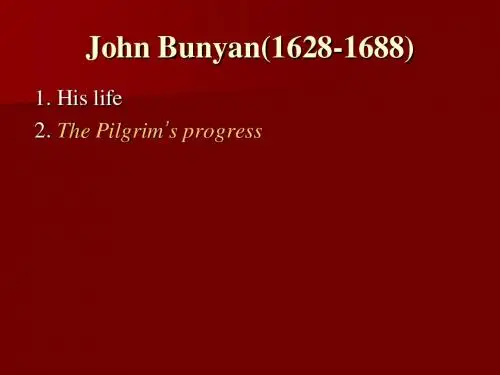
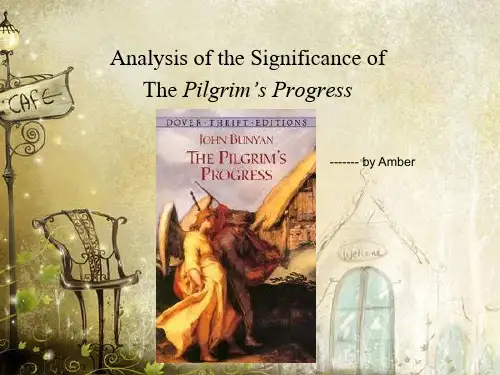
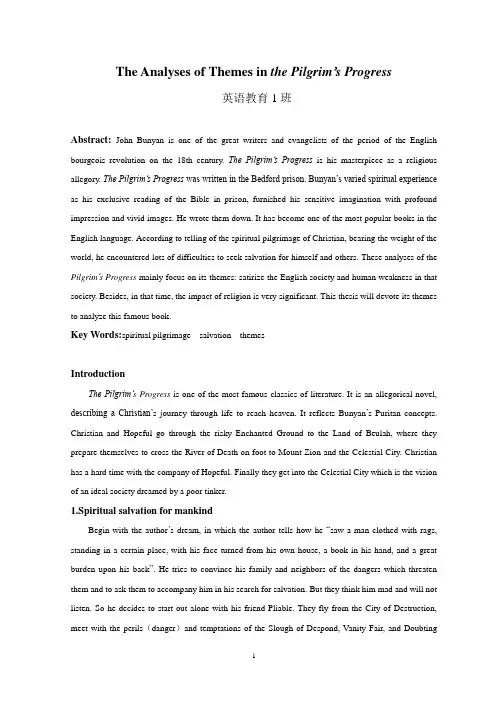
The Analyses of Themes in the Pilgrim’s Progress英语教育1班Abstract: John Bunyan is one of the great writers and evangelists of the period of the English bourgeois revolution on the 18th century. The Pilgrim’s Progress is his masterpiece as a religious allegory. The Pilgrim’s Progress was written in the Bedford prison. Bunyan’s varied spiritual experience as his exclusive reading of the Bible in prison, furnished his sensitive imagination with profound impression and vivid images. He wrote them down. It has become one of the most popular books in the English language. According to telling of the spiritual pilgrimage of Christian, bearing the weight of the world, he encountered lots of difficulties to seek salvation for himself and others. These analyses of the Pilgrim’s Progress mainly focus on its themes: satirize the English society and human weakness in that society. Besides, in that time, the impact of religion is very significant. This thesis will devote its themes to analyze this famous book.Key Words:spiritual pilgrimage salvation themesIntroductionThe Pilgrim’s Progress is one of the most famous classics of literature. It is an allegorical novel, describing a Christian’s journey through life to reach heaven. It reflects Bunyan’s Puritan concepts. Christian and Hopeful go through the risky Enchanted Ground to the Land of Beulah, where they prepare themselves to cross the River of Death on foot to Mount Zion and the Celestial City. Christian has a hard time with the company of Hopeful. Finally they get into the Celestial City which is the vision of an ideal society dreamed by a poor tinker.1.Spiritual salvation for mankindBegin with the author’s dream, in which the author tells how he “saw a man clothed with rags, standing in a certain place, with his face turned from his own house, a book in his hand, and a great burden upon his back”. He tries to convince his family and neighbors of the dangers which threaten them and to ask them to accompany him in his search for salvation. But they think him mad and will not listen. So he decides to start out alone with his friend Pliable. They fly from the City of Destruction, meet with the perils(danger)and temptations of the Slough of Despond, Vanity Fair, and DoubtingCastle, face and overcome the demon Appollyon, and finally come to the Delectable Mountains and the Celestial City.Although no person believes him, he never changes his mind to pursue his salvation for mankind. So it is not hard to find that western people attach more importance to individual and freedom.2.A biting satire on the English societyOne of the most remarkable passages is that in which Vanity Fair and the persecution of Christian and his friend Faithful. They come to Vanity Fair. As they refuse to buy anything but Truth, they are beaten and put in a cage, and then taken out and led in chains up and down the fair, and at length brought before a court. Judge Hate-good summons three witnesses: Envy, Superstition and Pickthank who testify against him. The case is given to the jury, composed of Mr. Badman, Mr. No-good, and Mr. Malice, etc. Each gives a verdict against Faithful, who is presently condemned. Here Bunyan intends to satirize the state trails in the preliminary to hanging, drawing and quartering.3.Power of knowledgeThe pilgrim must advance spiritually as he or she advances geographically. The key factor is knowledge, which must increase as the pilgrim proceeds forward. Christian never makes the same mistake twice or meets the same foe twice, because he learns from his experiences. And the importance of reading is emphasized throughout The Pilgrim’s Progress because the pilgrims reach salvation and happiness by understanding the Bible. The pilgrims who have not read and do not understand the Bible are viewed as disappointments, who will not gain entry to the Celestial City. We can see the power of knowledge is significant.4.The value of CommunityBunyan emphasizes here that spirituality is best when it is communal. Christian does not end up in solitary bliss wandering alone in heaven but in the Celestial City filled with happy throngs of residents. His community is a large group of similar minded people. Christian learns in the end: spiritual existence should involve togetherness.ConclusionAccording to analyzing themes of the Pilgrim’s Progress, we have almost acknowledged its themes. As a typical puritan, Bunyan aspires extrication from the cruelty and reaches the heaven. The Christian finally gets into tranquil heaven after encountering so many miseries, which is the indication of the trend of appearing Bourgeois. They are struggling to take the place of the feudal autocratic systemgradually.The Pilgrim’s Progress is just like an elder Wiseman, he tells us a lot of truths and experiences of life which help us live a better life and enlighten our heart. He tells us man should have faith and an affirmative attitude towards life. And the Christian’s courage and persevering will incarnate the aggressive and indomitable spirit of the Bourgeois.BibliographyBunyan, John. Pilgrim’s Progress[M]. USA:Winston Company, 1933.侯维瑞. 英国文学通史[M]. 上海:上海外语教育出版社, 1999.刘炳善. 英美文学简史[M]. 河南:河南人民出版社, 2006.魏晓红. 英美文学自主学习与实践[M]. 天津:天津大学出版社, 2011.。
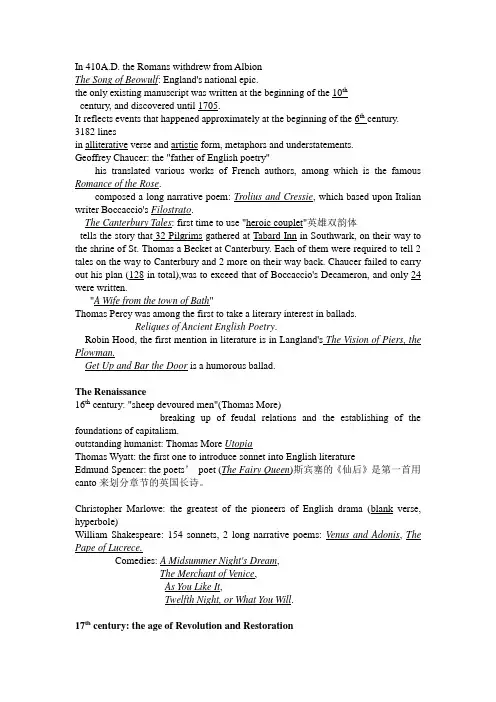
In 410A.D. the Romans withdrew from AlbionThe Song of Beowulf: England's national epic.the only existing manuscript was written at the beginning of the 10thcentury, and discovered until 1705.It reflects events that happened approximately at the beginning of the 6th century. 3182 linesin alliterative verse and artistic form, metaphors and understatements.Geoffrey Chaucer: the "father of English poetry"his translated various works of French authors, among which is the famous Romance of the Rose.composed a long narrative poem: Trolius and Cressie, which based upon Italian writer Boccaccio's Filostrato.The Canterbury Tales: first time to use "heroic couplet"英雄双韵体tells the story that 32 Pilgrims gathered at Tabard Inn in Southwark, on their way to the shrine of St. Thomas a Becket at Canterbury. Each of them were required to tell 2 tales on the way to Canterbury and 2 more on their way back. Chaucer failed to carry out his plan (128 in total),was to exceed that of Boccaccio's Decameron, and only 24 were written."A Wife from the town of Bath"Thomas Percy was among the first to take a literary interest in ballads.Reliques of Ancient English Poetry.Robin Hood, the first mention in literature is in Langland's The Vision of Piers, the Plowman.Get Up and Bar the Door is a humorous ballad.The Renaissance16th century: "sheep devoured men"(Thomas More)breaking up of feudal relations and the establishing of the foundations of capitalism.outstanding humanist: Thomas More UtopiaThomas Wyatt: the first one to introduce sonnet into English literatureEdmund Spencer: the poets’poet (The Fairy Queen)斯宾塞的《仙后》是第一首用canto来划分章节的英国长诗。

Part Three The Period of the English Bourgeois Revolution第三部分英国资产阶级革命时期I The English Revolution and the Restoration 英国革命和复辟Literature of the Revolution Period 革命时期的文学:The spirit of unity and feeling of patriotism ended with the reign of Elizabeth I, and England was then convulsed with the conflict between the two antagonistic camps, the Royalists and the Puritans. English literature of this revolution and restoration period was very much concerned with the tremendous social upheavals of the time. Milton, one of the greatest poets of England, defended the English Commonwealth with his pen.随着伊丽莎白一世统治的结束,人们统一的精神和爱国主义的感情也随之而去。
英国因为量大对抗阵营——保皇党和清教徒的冲突而骚乱。
英国革命和复辟时期的文学主要与当时的社会巨变有关。
英格兰最伟大的诗人之一弥尔顿用他的笔来捍卫英国共和制。
II Milton 弥尔顿1.Life and Work 生平和作品(1)Life: John Milton was born in London in 1608.约翰·弥尔顿1608年出生于伦敦。
Questions and comments1.John MiltonIn his article To Mr. Cyricak Skinner upon his blindness, John Milton expresses his loyalty to the revolutionary cause. Though he is blind, he is not a bit discouraged. The idea of having lost his eyesight for the revolution makes him proud of himself, and it inspires him to carry on his fight.2.T o be or not to beHere Hamlet is pondering on the question of life and death. He is thinking of committing suicide, that is, to end his own life by a sudden act of ‘bravery’. But he hesitates, for he doubts whether death can give him rest and peace. Besides, he is not sure whether the country would be better than this one. He gives the reasons why he wants to commit suicide. Apart from his personal revenge, he cannot bear the social injustices and grievances. He is conscious of his own weakness of thinking too much which makes him dilatory, allowing many opportunities to slip away.3. A modest proposalA modest proposal is a more bitter satire on the policy of the English government towards theIrish people. The article is marked by its fierce irony and mock-seriousness. Swift in this article suggested to the Irish people that the best way to end their misery was to produce children and sell them at market as a delicious dish for the rich. Besides, in the article, Swift also shows his great love and sympathy for the poor Irish, and his fiery indignation for the ruling class.Questions and answers1.Letter to Lord ChesterfieldThis letter of Samuel Johnson’s marks the end of English literature on the patronage of noblemen for support and is a kind of literature declaration of independence. For many years, some English writers depended on their patrons for support. In 1747, Johnson addressed his plan for the dictionary to Lore Chesterfield-‘a distinguished patron of literature’. However, during the years of Johnson’s hard work on the dictionary, Lord Chesterfield offered neither aid nor encouragement. On the eve of the publication of the dictionary he expected that Johnson would dedicate the dictionary to him. Therefore, Johnson wrote this letter to him. 2.The pilgrim’s progressIt is written in the old fashioned medieval form of allegory and drama. The book opens with the author’s dream in which he sees a man ‘with a book in his hand, and a great burden upon his back. It tells how Christian starts his pilgrimage from his home to the kingdom of Heaven, and of his experiences and adventures.In the western world, this book has usually been read and appreciated as religious allegory. It gives a real picture of how life was during the 17th century, which is a faithful panoramic reflection of Bunyan’s age. His satire towards the ruling class which makes the reader be conscious of religious and political persecution. His simple and lively prose style and idiomatic expressions and biblical language enable him to narrate this story and reveal his ideas directly and in a straightforward way.3.The Canterbury T alesThe general prologue is considered the best part of the whole work. It not only provides aframework for the tales but also contains a vivid description of typical medieval figures. All classes of the English feudal society, except the royalty and the poorest are represented by these pilgrims.Significance1)It gives a comprehensive picture of Chaucer’s time2)The dramatic structure of the poem has been highly commented by critics3)Chaucer’s humour4)Chaucer’s contribution to the English languageThrough the whole tales, Chaucer highly praises man’s energy, intellect, quick wit and love of life. At the same time, he attacks the degeneration of the noble and the corruption of the church.4.Romeo and JulietIn this famous garden scene, despite the family feud, a pair of innocent lovers expresses their love for each other. Shakespeare’s humanism is evidently seen in his praise of human love and in his defiance of feudal discord.5. A modest proposalHumanismHumanism is the main ideal and essence of Renaissance, which appeared on the literature scene during the reign of Queen Elizabeth. Humanist scholar took great interest in the welfare of human beings. They argued that man should be given full freedom to enrich their intellectual and emotional life. In religion, they demanded the reformation of the church. In art and literature, instead of saying praise to God, they sang in praise of man and of the pursuit of happiness in this life. Humanism shattered the shackles of spiritual bondage of man’s mind by the Roman Catholic Church and opened his eyes to ‘a brave new world’ in front of him.Neo-classicismNeo-classicism was dominant in English literature for more than a century from about the middle of the 17th century to about the end of the 18th century. It is a tendency towards imitation of the great writers of ancient Greece and Rome, and the attempt to duplicate their characteristics, simplicity, unity, restraint, universality, elegance, uniformity, and correctness. Neo-classicism writers believe that the rules of writing could be derived from the classics to imitate them was to imitate nature. They frowned on irregularities and had contempt for ‘enthusiasm’. The three unities and the heroic couplet in poetry were their literary ideas.Essay writingT o be or not to be-Hamlet (act III, scene 1)This well-known soliloquy comes from Shakespeare’s famous drama Hamlet, which expresses Hamlet’s indecisiveness. The melancholy prince is pondering on the question of life and death, thinking that death may be a good means of escape from this world that is full of ‘slings and arrows’, the injustice, conspiracy and betrayal in the society. But fear of death, ‘the undiscovered country’makes him rather bear the sufferings in this world. It also shows his utter world-weariness and his disillusionment with the corrupt and degenerated society in which he lives. In this play, Shakespeare sings high praise of the noble quality of the prince Hamlet as a humanist thinker.。
A Brief History of English LiteratureThe Pilgrim’s ProgressName:Number:Class Number:Teacher:The Pilgrim’s ProgressAs Banyun’s most significant work, The Pilgrim’s Progress met with warm reception after it came out. It’s not strange that The Pilgrim’s Progress became a book owned by almost every family in England for two following centuries, a record perhaps only next to the Bible itself. Translated into over 200 languages,The Pilgrim's Progress is one of the most famous classics of literature.Ⅰ.The AuthorJohn Bunyan (1628一1688), the author of The Pilgrim's Progress, is recognized as one of the most famous English allegorists. John Bunyan was born into a tinker's family in 1628. He was sent to school for a short time, but he was soon busy in his father's shop. When he was not yet sixteen his mother died; in two months his father married again. In 1642 he joined the parliamentary army and in 1647 was honorably discharged. Then he married a wife whose piety redeemed him from his delight in rural sport and the habit of profane swearing. He got interested in religion and in a few years joined a small group of non-conformists. His influential preaching astonished and enraged the authorities and then upon his refusal to leave off preaching, the justice committed him to Bedford jail, where he lay for nearly thirteen years. And it was here, in this period, he wrote the wonderful The Pilgrim's Progress.Ⅱ.The Plot LayoutIt is an allegorical novel, describing a Christian's journey through life to reach heaven. In this allegory, Christian and his company progress on a spiritual pilgrimage according to the instructions in the Bible. Despite their occasional diversions, they always hold to the Divine truth. Therefore all of them get an access to the world of eternal blessing, honor, glory and power. The readers must have exulted at the desirable salvation of the Christian family, because they are pilgrims on the same road. They encounter similar trials, temptations and difficulties. No doubt, the breadth of religious sympathies accounts for the universal acceptableness of The Pilgrim's Progress.Ⅲ.Writing Features--Biblical AllegoryA.The Biblical Allegory of theThemeThe theme that life is a pilgrimage has been widely used by western writers. The Bible, the most important source of Bunyan’s writings, deseribes that human beings live on the earth as pilgrims, and in all their life they “seek a homeland”, “a heavenly country”, (Hebrews 11:11,16). In The Pilgrim’s Progress, literally the hero Christian undergoes a journey from his hometown to his destination; allegorieally, it is a spiritual pilgrimage for everyman to pursue self-understanding and salvation.B.The Biblical Allegory of the NarrativeThe Status of the Bible can Provide the gauge to the possibilities of allegory, and the nrrative of the Bible provides the arehetype for literal works. As in The Pilgrim’s Progress, “the narrative sense” in the reading of the Bible remains “direetly, as in the Methodist’s devout use of the Bible... In tracing and treading the path from sin to perfetion.,(Frei152).C.The Biblical Allegory of the CharaeterizationAs the pretext of The Pilgrim’s Progress, the Bible makes its mark not only on the text’s theme and narrative, but also on its characterization. In The Pilgrim’s Progress, the characters in the work almost all serve exclusively to present unambiguously a certain principle in the doctrine of the Bible. The characters, such as Ignoranee, Talkative, Lord Hategood, Obstinate, Pliable etc., in a sense are not characters; they are even not character types; they are the reifieation and personifications of very explicit characteristics introduecd inio the text in order to illustrate a clear point. In a sense, there is only one charaeter in this story, Christian himself: the fulfillment of his salvation depends upon various stages of his spiritual growth.Ⅳ.Spiritual InfluenceThe Pilgrim’s Progress nearly has the same reputation with the Bible in western countries. It shows the author’s incomparable respect and devoutness by the hero Christian’s speech. The attitude of the Christian to god was absolutely complete. He followed God’s every orders and dared not to have any fault. And his efforts had gained plentiful reward. After a series hardship and trial, the Christian was welcomedinto the dreamed paradise holy city by the angel. Saying as the ideological content, John Bunyan’s The Pilgrim’s Progress is the most respectful work to God.For the above analysis, the Pilgrim’s Progress is undoubtedly successful. It influences the readers’mind greatly; meanwhile its many rhetoric and sentence making had been wildly cited as proverb, common saying, idiom and classical expressing ways in the English world. Bunyan achieved his faith, which was established by dream for using his The Pilgrim’s Progress.Ⅴ.References[1]谈竹琴. The Influence of The Bible on The Pilgrim's Progress[J]. 读与写(教育教学刊),2009,03:6-7+31.[2]林雅琴. The Christian Doctrines of Salvation at the Earlier Stages of The Pilgrim's Progress[J]. 海外英语,2011,09:278-279.[3]刘俊楠. A Tentative Feminist Exploration of the Innovation and Evolution of The Pilgrim's Progress-in Comparison with the Bible[D].赣南师范学院,2011.[4]李果. On the Biblical Allegory inThe Pilgrim’s Progress[M].湖南师范大学,2006,10.。